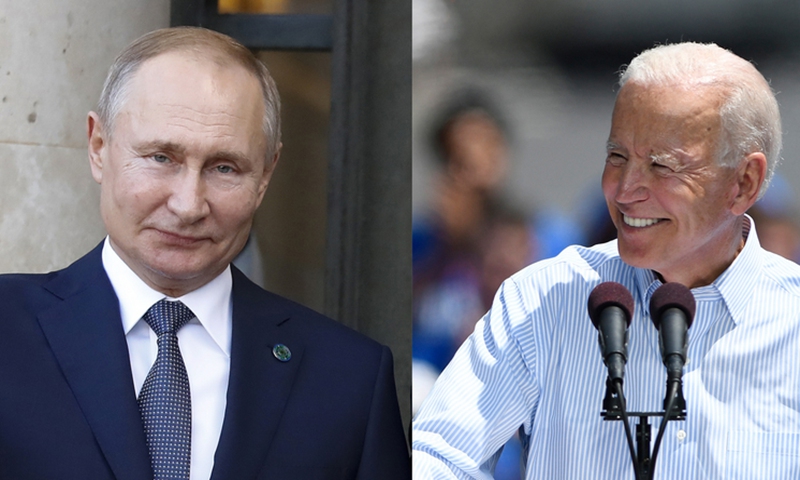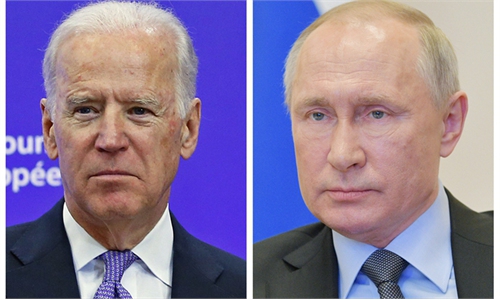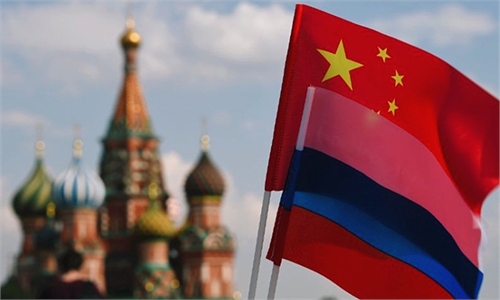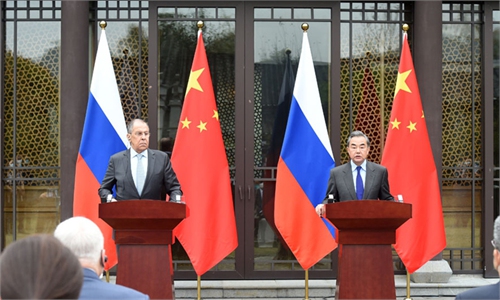
Xinhua file photos of Russian President Vladimir Putin (L) and U.S. President Joe Biden
Editor Note:US President Joe Biden and his Russian counterpart Vladimir Putin are set to hold their first summit in Geneva on June 16. Observers argue the recent US-Russia engagement, including the Lavrov-Blinken meeting, revealed that Washington wants Moscow to pivot away from Beijing. "China-Russia partnership is strong enough to withstand nascent US overtures," said Danil Bochkov (Bochkov), an expert at the Russian International Affairs Council. How much can the Biden-Putin summit fix the US-Russia rift? Why can't the US succeed in dividing China and Russia? Bochkov shared his views with Global Times (GT) reporter Yu Jincui in a written interview.
GT: What're your expectations for the Biden-Putin summit? To what extent can US-Russian relations be eased?
Bochkov: It is too early to say that Russia-US relations are heading back to normality, but clearly the intentions of Biden's administration for seeking stability with Moscow are crystalizing following years of alienation and rivalry. Putin-Biden summit is likely to concentrate on the same range of issues discussed during Lavrov-Blinken rendezvous, which can be divided into global and regional groupings. On the world level, it is nonproliferation, arms control, pandemics and climate change. Secondly, there are North Korea, Afghanistan, the Middle East tensions, including Syria, Iran and the recent escalation of Palestine-Israel conflict and other pressing issues of mutual concern. Biden is also likely to raise US concerns, such as Biden-prioritized human rights issues originating from Alexei Navalny's suitcase. It will see Russia's foreign policy maneuvering deemed provocative in Washington, including Ukraine and cyber security; which proved to be high on the agenda following the hack on the Colonial Pipeline, and Moscow's recognition by the US as this presenting "serious intelligence threats".
No breakthroughs should be expected since it is the very first top-level meeting in recent years; one which is taking place against the backdrop of a very wrecked and dire state of relations. Russia and the US could if not ease the relations, but bring some mere stability to them by bringing most pressing issues to the negotiation table. If Moscow and Washington manage to maintain Lavrov-Blinken "businesslike and productive" style of the discussion - the exchange of positions may be more sincere paving the way for further interactions.
GT: The Biden administration has waived sanctions on the company behind Russia's Nord Stream 2 gas pipeline to Germany and its chief executive. This was considered a signal Washington sent to seek a thawing of relations with Russia. What's' the motive behind Washington's attempt to fix relations with Russia? One view holds that Washington is increasingly finding itself incapable of containing both China and Russia simultaneously. Is this true?
Bochkov: The waiving of sanctions on the Nord Stream 2 project operator is more a sign of goodwill not for Russia, but Washington's strategic ally - Germany, which has been growing more irritated over US attempts to ruin the project at all cost. Washington is pursuing some distant stabilization of relations with Moscow, since it does not see any practical good in keeping a hardline by opposing Moscow and Beijing simultaneously with resources— which are not enough to combat them both. China, not Russia, is officially recognized by the US as a threat and main challenge of maintaining the US 'leading positions in the world. Therefore, it is more logical and tactically correct to funnel limited resources to contain China, while playing a balancing game with Russia by cooperating where it is possible, and disagreeing where interests divert.
GT: Some analysts believe the US wants Russia to pivot away from China. You said the China-Russia partnership is strong enough to withstand nascent US overtures in your recent column for the South China Morning Post. Why is the US attempt to drive a wedge between China and Russia unable to succeed?
Bochkov: Obviously, the US would benefit from hypothetical confrontation between Russia and China, because without each other's support their positions in the globe significantly weaken, losing positive inertia of balancing interests and cooperating on multiple levels. The US would not be capable to divide Moscow and Beijing, since they understand that opposing Washington's pressure together is their naturally overlapping interest, which makes the relationship steadfast and untouched by any global political turbulence. It is also proven historically if one looks at the time Russia-China started forging better ties. It happened in 2001 and was marked by the signing of the Sino-Russian Treaty of Friendship, which has evolved ever since into the highest level of relations now.
GT: Will Washington intensify its efforts to sow discord between Beijing and Moscow in the future? In which areas will it try to drive a wedge between them? How can China and Russia jointly deal with this pressure?
Bochkov: The US in the near future is more likely to concentrate on patching the relations with Russia in possible areas of mutual concern in order to avoid simultaneous confrontation with Moscow and Beijing on both fronts. Russia and China do not have such fields in their bilateral relationship, which would be out of their capability to be jointly addressed and resolved. Moscow and Beijing have already demonstrated their close coordination of efforts within the UN Security Council and other multilateral bodies and usually had similar or close positions on most pressing international issues. Now, Russia and China come into regular consultations following their interactions with the US, and exchange in a face-to-face setting what has been discussed during their talks with Washington.
GT: Both China and Russia recently said that they won't let the US speak with it, "from the position of force." What message does this send to the US? Even if Washington signals its willingness to ease relations with Russia now, can the US really place Russia on an equal footing when treating and speaking with it?
Bochkov: It might mean that Moscow and Beijing are enjoying their close proximity of the positions that shape their deep-rooted trust. They could together oppose any external pressure and would not allow the US to scold them over their sovereign decisions and actions. Moreover, even if the US does not recognize Russia as an equal partner it has to come to terms with its global influence and military might, which actually is the most important reason behind the US' recent attempts to find some degree of stability in the relationship.
GT:President Putin said Moscow-Beijing relations have reached their "highest level in history." What's the driving force for China-Russia relations to continuously deepen? Chinese State Councilor and Foreign Minister Wang Yi said, "in developing China-Russia strategic cooperation, we see no limit, no forbidden zone and no ceiling to how far this cooperation can go." In which areas do the bilateral relations still have room for further improvement?
Bochkov: Russia and China have developed their relations to such a level, where they now encompass nearly all domains of bilateral cooperation - from economics and politics to global governance, technology, military and humanitarian exchanges. Since most areas of the partnership have been explored, the next steps would likely be to expand them further by increasing the intensity and depth of those cooperative fields. It might be done via more trust-based exchanges of sensitive technologies, as exemplified by decisions of both states to mutually integrate their space programs and co-develop a missile defense system.



